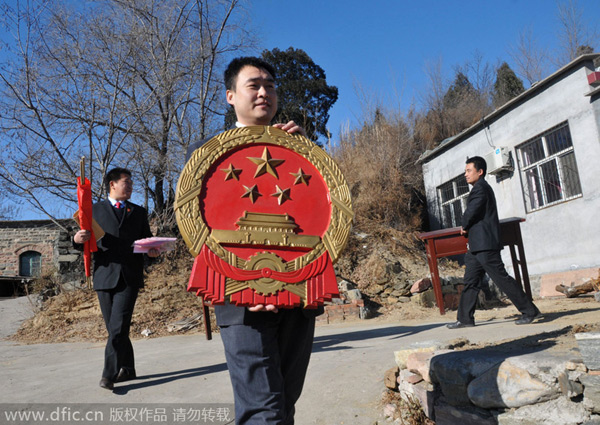 |
|
A judicial officer holds the national emblem of China in Jiangjunmu village, Xingtai county, Hebei province, Dec 2, 2014. [Photo/IC] |
The petitioner, a high-tech company, appealed to the SPC after the higher people's court in the Guangxi Zhuang autonomous region denied a motion asking a machinery company to bear the liability for breach of contract worth more than 300 million yuan ($48 million).
To ease the pressure on the top court, the SPC opened the country's first two circuit courts, in Shenzhen and Shenyang, Liaoning province.
The move is part of judicial reforms designed to prevent local governments from interfering in cases and to provide a more convenient service for litigants.
The number of cases the SPC handles annually went up to a record high of 14,000 last year, according to the authority.
The circuit court in Shenzhen, inaugurated on Jan 28, is in charge of hearing administrative, civil and commercial disputes in the provinces of Guangdong and Hainan and the Guangxi Zhuang autonomous region.
The Second Circuit Court, inaugurated in Shenyang on Jan 31, is responsible for trying cases from Heilongjiang, Liaoning and Jilin provinces in Northeast China.
Judicial officers in the two courts are asked to rotate every two years, "to avoid interference from local governments", said Liu Guixiang, 52, the chief judge of the circuit court in Shenzhen.
"Cases that involve parties from more than one administrative division are easily influenced by regional protectionism because of territorial jurisdiction," he said.
"The circuit courts are part of the Supreme People's Court and the personnel, financial and property management of the circuit courts is under the central government. Therefore, the circuit courts are less susceptible to interference from regional protectionism."
The circuit courts also aim to cut litigants' travel fees and the cost of lawsuits, Liu added.
People in the six provinces and autonomous regions within the compass of the two circuit courts now needn't travel to Beijing to appeal to the SPC.
Although his court has its own courtrooms, Liu said that the judges will be able to travel to areas where disputes arise if necessary, making it even more convenient for litigants.
For example, the circuit court in Shenzhen will try its second case in a courtroom in Dongguan, Guangdong province, where the litigants are located.
Moreover, the presiding judge composes, signs and issues the written judgment and will bear the primary responsibility if the judgment perverts the law. In local courts, the judgment has to be approved by the court's president.
This means that judges appointed to circuit courts can pass a judgment in court.
"I'm given bigger power but bear a heavier responsibility," said Zhou Fan, the presiding judge of the case tried in Shenzhen, as quoted by Shenzhen Special Zone Daily.
"I can never be too cautious (in making the judgment), as if treading on thin ice," he said.
The circuit court in Shenzhen has received more than 500 batches of petition letters since Feb 2, "more than expected", Liu said. The court has accepted 17 of the incoming cases.
Cao Yin contributed to this story.
xujingxi@chinadaily.com.cn
Related Stories